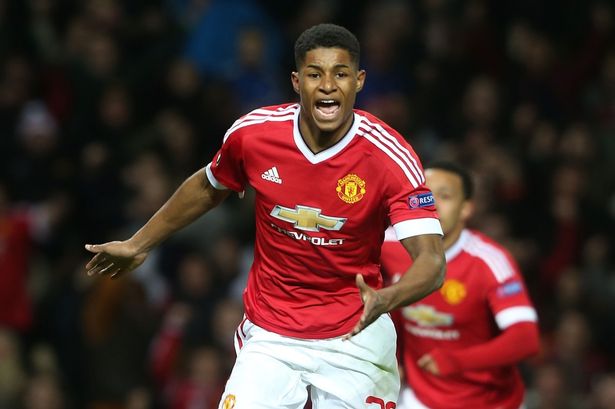If you follow football Twitter at all, you’ve probably seen commentary about Marcus Rashford’s ascent to the English National Team. There are two fairly clear sides in this argument.
Side 1: Hey, look at this amazing young Manchester United player who can’t stop scoring goals!
Side 2: He’s been really lucky to score as many goals as he has so far. Statistically, there is little reason to think he’s as good as his goal return suggests, so should he really be going to Euros?
I was intrigued by the stats argument for a lot of reasons, not least because I hadn’t seen anyone actually examine whether it was true outside of some hot takes. Additionally, I figured it was a topic that would let me discuss young player statistical development, an area that has always intrigued me, in a context that people might care about.
Hot or Not: Marcus Rashford
Having seen Rashford score two goals in living colour (I was at Midtjylland Europa League knockout tie at Old Trafford), I can tell you he looks like a genuine football player. He’s reasonably tall, has a good frame, but he's an 18-year-old who is still filling out. He’s got good pace and thus far seems to have a great knack of timing his runs to be in the right place at the right time. That’s an incredibly valuable skill if it can be done consistently. Aside from physical attributes, he has two massive things going in his favor.
- He is playing games in the Premier League at 18 years old.
- He is scoring goals in the Premier League at 18 years old.
Both of these things are unusual, but the second is extremely so. The very fact he is being selected to play PL matches at all at this age suggests he’s an elite talent, and the fact that he’s scoring goes a long way toward reinforcing it. So what are the stats guys on about? The problem is that Rashford doesn’t generate any real shot volume. 1.7 shots per 90 is well below the level of elite forwards, and because of that his goal return of basically 1 every 2 games is questionable.
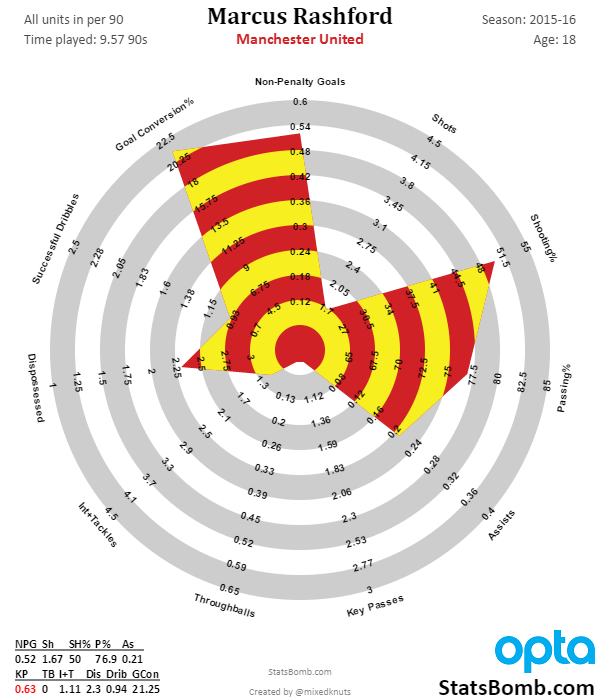
Compare this to what I produced from a similar small sample size of Harry Kane games and you can see what might be worrisome.
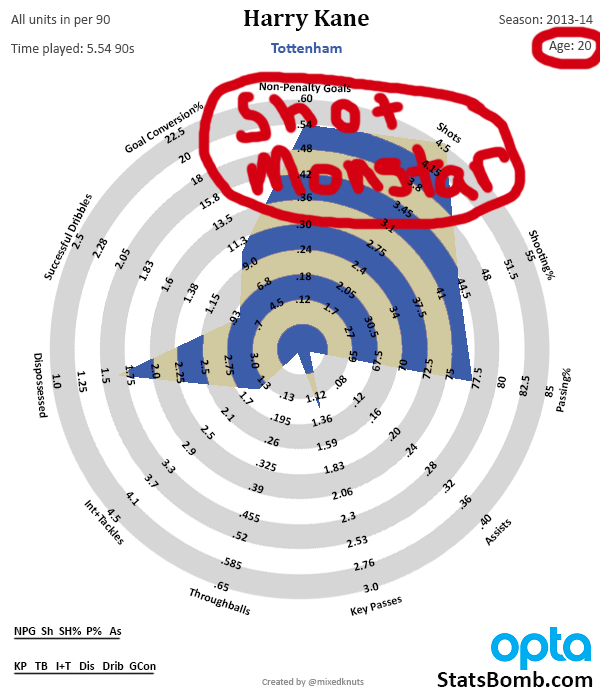
Then again, I was poking around with the radar generator and remembered that this looked very similar to another player whose goal scoring has consistently surprised me at Lazio.
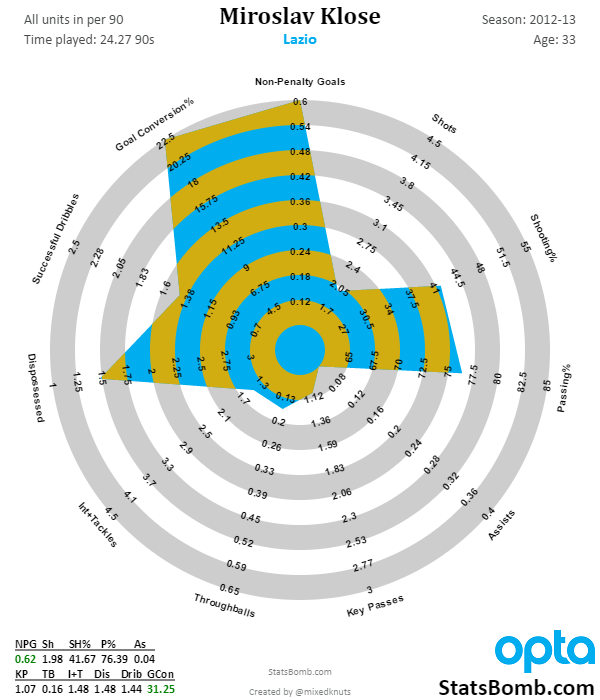
Klose has an amazing knack for scoring goals without generating a lot of shots, and it has been surprisingly sustainable in Serie A. Bas Dost is another guy who consistently generates amazing expected goals per shot throughout the data I have on his career. Maybe Rashford is a shot quality monster without being a volume monster?
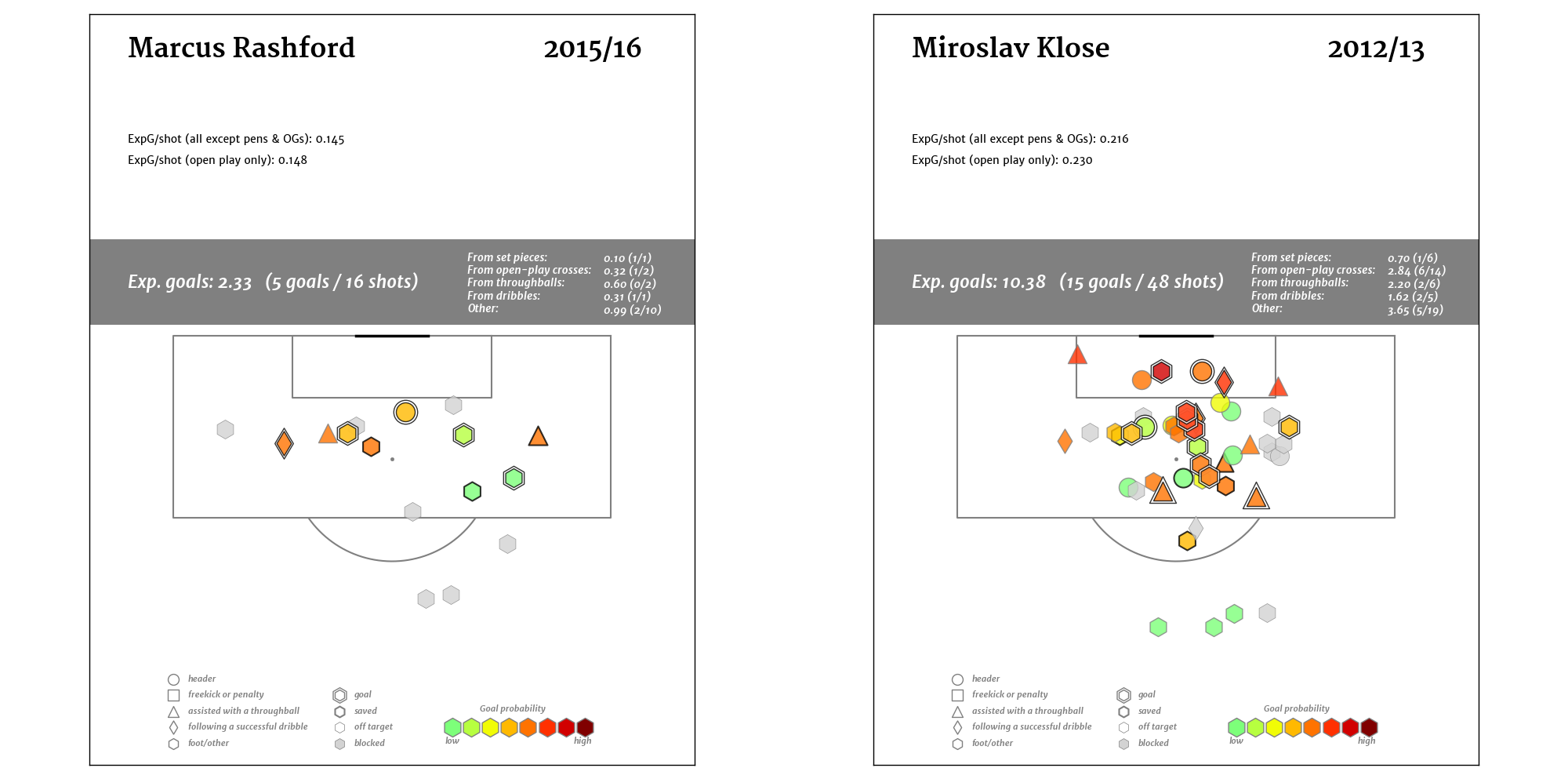
Or maybe not… Rashford’s shot quality is solid for a center forward, but nowhere close to the elite levels of Klose or Dost.
So yeah, he’s probably riding a bit of a hot streak, and maybe he was also fortunate to be chosen by Hodgson to go to Euros. I don’t have a problem with it – England always seem to take a teenage player to major tournaments anyway, and Rashford is this year’s mascot.
What Can We Infer About Rashford’s Future Career?
Short answer: not much, but he’s likely to be pretty good.
The reason behind this are the two elements I mentioned above.
It is damned hard for 18 year olds to perform against adults, and that’s especially true in the Premier League. Rashford has done that, so the null hypothesis – in my opinion at least – is that he’s pretty good simply by being selected at all and then scoring goals.
Okay, but what about the shot volume issue? Well that is the tricky element that forces us to look more closely at player development, and how we think it occurs versus how it actually occurs. For those of you unfamiliar with this topic, there’s a concept out there called the age curve and it suggests that on average, football players peak somewhere between 24 and 28.
Now this doesn’t mean that all players peak in this period – some might peak at 22 and others strangely late at 30 – but across the population this trend holds very strongly to be true. Marcus Rashford is 18, meaning he probably has another five to six seasons before we see his peak output. Add five or six years of shot volume to a trending chart and you’ll likely wind up somewhere pretty good.
On the other hand, don’t expect this to be a smooth curve – real player development tends to be anything but. This chart is taken from baseball velocity development (thanks @drivelinebases), but skills and output in football are similar.
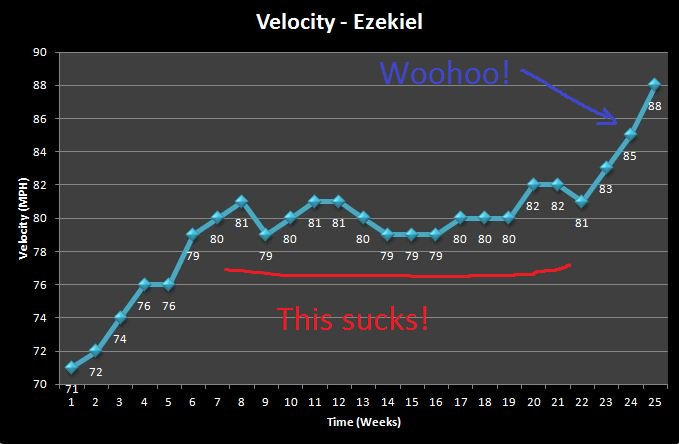
If you are expecting a smooth curve, you’d get to week 14 or 15 and want to kill yourself.
OH MY GOD WHY IS THIS NOT WORKING?!?
The human body, biomechanics, the sport of baseball (or football) are all incredibly complex things, so expecting an easy input to output relationship is a recipe for disappointment.
And calling the peak versus the plateau is almost impossible. Has Romelu Lukaku peaked yet? I don't know - he's looked like a grown ass man since he was 17 years old. I can give you a probability as to whether this has happened or not, but the fact of the matter is that I am not going to KNOW the answer to that question for another couple of years, and neither will anyone else.
This is why focusing on the process matters.
You can control the process, even if you rarely control the outcome.
This is true in player development just as it is true in the league table. Back to our young Manchester United player - with this small an amount of league data, we don’t know how Rashford will develop, so we have to make some guesses based on the aforementioned selection biases as priors. 18-year-olds who score reasonable amounts of goals in the Premier League tend to go on to have excellent Premier League careers.
That said, would I want to rely on Rashford to be United’s primary striker next season? Eh…
Can We Use Data to Evaluate Young Players?
This question came up at Science + Football a couple of times and the answer is yes, with some caveats.
- The first challenge is getting reliable data, and many years of it.
- The second challenge is making sure that data stays valid.
- And the third challenge is using that data to build trends where you can evaluate approximately how good those young players are and how good they potentially will be.
You are never going to be perfect with this. You might not even be able to get close. But you can probably get better than knowing nothing objective, which is an improvement on the status quo.
One thing I suggested to Midtjylland’s academy last year was that they get on the same data format that we use to evaluate first team prospects, so that we’re able to match up all the advanced metrics and provide them with similar analytical tools.
Additionally, with enough information, we could start evaluating statistical development patterns in their best youth players. In order to do this, they would need to send off past seasons of video to be coded by Opta (the data company we used) at the U-19 and potentially U-17 levels.
With this information, we could then track a player’s progress through the development teams and into the first team (or other clubs in the data set), and understand what those players looked like at different stages in their development.
Another area where tracking younger player statistical output is potentially a huge boon is with teams that have a lot of loanees. If a Manchester City or Chelsea send all their loanees to leagues where they have data, they will gain an incredible amount of clarity about their own players’ performance.
They can then use that information to better assess what the next loan should be, as well as which players are most likely to become good enough to make their first team, and which players are probably better to sell on now.
With the right people working on this project, they can also develop an objective pricing model for those players’ future transfer values. Given all the information above, perhaps the most interesting questions now are
- What should we expect from Marcus Rashford next season? and
- What would be best for the continued development of his career?
The new manager at United is Jose Mourinho, a genius, but also someone who has been remarkably stingy about handing out valuable playing time to young players. What likely will not be best for Rashford will be to ride United's bench for the entire season, with only a handful of Cup appearances to his name.
